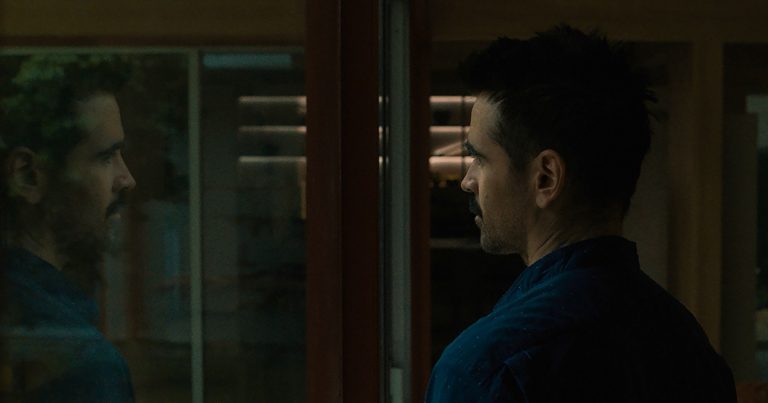After Yang (2021 | USA | 96 min | Kogonada)
After Columbus, about two people quietly getting to know each other on an impromptu architectural tour of a small town, became a surprise critical darling, many were curious about where Kogonada would go next. The answer: to the future with Colin Farrell. Seeing his new film, After Yang, during its stateside premiere at Sundance this weekend also answered the question of whether there would be any truly great movies shown at this festival and/or released in 2022.
Set in a future glittering back-to-nature version of a United States that has recovered from an unspecified calamitous reconfiguration, the film centers around a family whose factory-refurbished android has malfunctioned within the warranty period. We meet them as they are posing for a bucolic portrait in a grassy clearing and later watch as they virtually compete against thousands of other families in a weekly synchronized dance competition. It’s there, after an incendiarily entertaining opening credit sequence that the beloved Yang’s troubles begin.
Played with sensitive curiosity by Justin Min, we learn that the title “technosapien” Yang joined the family as a synthetic sibling to provide cultural context to an adopted Chinese daughter (Malea Emma Tjandrawidjaja, in a wondrous debut as Mika). The father (Colin Farrell as Jake) runs his own artisanal tea shop (only the old stuff, none of these new-fangled crystals); the mother (Jodie Turner-Smith, Kyra) has a more vaguely corporate, time-demanding job with long hours and urgent presentations. Collectively, they’ve relied on Yang to do so much more than provide fun facts about China to their growing daughter who adores him as her primary caregiver, confidant, and source of almost-human contact.
And so, when his internal systems glitch, the balance of their household — with its soft muted color schemes, golden glowing light fixtures, and walls lined with tasteful plant life — falls into immediate crisis. Kyra wonders whether their over-reliance on him has been entirely healthy. Mika is bereft at the loss of her companion. Jake is desperate to get Yang repaired by any means necessary, trekking in terrarium-like Ubers from soulless corporate help desks to underground repair shops to a museum of technosapiens with an unconscious android slumped over his shoulder.
Farrell’s introspective journey introduces some good supporting character work from the likes of Clifton Collins Jr. as an eager-to-befriend neighbor and Sarita Choudhury as a sympathetic researcher while also gradually revealing the parameters of this world and the dimensions of their relationship with Yang. Through delicate editing and intricate sound design, Kogonada leads us on gentle exploration of the ideas of family as each member revisits their memories of their time with the beloved but absent android.
When the plot contrives a way for Farrell to experience the world through Yang’s eyes, in three-second clips arrayed like a galaxy in a virtual forest, the scope of the film widens to consider the perceptions of mortality and the very nature of being alive. Even as the film’s concerns sprawl more broadly and dig more deeply, its remains firmly planted by the trio of actors who struggle to come to terms with their reconfigured family. As a sonic, visual, and emotional journey, the tone is quiet and reserved, which makes the profundity of its resolution and revelations all the more breathtaking.
After Yang played in Sundance’s Spotlight programming and is expected to be released by A24 later this year.




